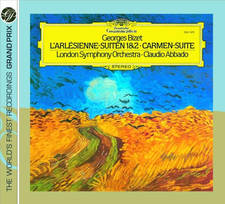The Full Works Concert - Monday 7 April 2014
Dvořák's Eighth Symphony - inspired by the Bohemian folk music that the composer loved - is the centre piece of tonight's Concert.
This evening's concert opens with Ludwig van Beethoven's Egmont Overture. It was written around 1809-10 as the opening piece of the incidental music for a play by Goethe. It tells the story of a 16th-century Dutch nobleman, the Count of Egmont, and in the music - which is in a similar style to the Fifth Symphony which he had completed two years earlier - Beethoven expressed his own political convictions through the exaltation of the heroic sacrifice of a man condemned to death for having taken a stand against oppression. The Overture became an unofficial anthem of the 1956 Hungarian revolution.
A century and a half after its composition, Mendelssohn’s Violin Concerto remains one of the most regularly performed and most loved of all instrumental concertos. And ever since its birth, the work has had a rather special affinity with very young soloists. When Mendelssohn was a teenager, he forged a very strong friendship with fellow composer Ferdinand David. As well as being a fine writer of music in his own right, David was also one of the most accomplished violinists of his day, so Mendelssohn composed this concerto for him. It took Mendelssohn five years from start to finish, during which time he would regularly seek David’s advice on revisions, themes and structure. Its premiere in 1844 featured David at the fiddle and another composer, the Dane Neils Gade, conducting. The teenage Mendelssohn, who was inspired to compose this piece, would surely have been proud that, centuries on, it is still often the first choice for budding young soloists today.
Handel's seventh Concerto Grosso is the only one of his twelve Concerti Gross that is scored for full orchestra: it has no solo episodes and all the movements are brief. Taking the older concerto da chiesa and concerto da camera of Corelli as models, rather than the later three-movement Venetian concerto of Vivaldi favoured by Bach, they were written to be played during performances of Handel's oratorios and odes.
Dvořák's Symphony No. 8 in G major was composed and orchestrated within a two-and-a-half-month period in 1889 and dedicated by the composer to 'the Bohemian Academy of Emperor Franz Joseph for the Encouragement of Arts and Literature, in thanks for my election.' The Eighth Symphony is performed not nearly as often as the more famous Ninth. It's a cheery work and draws its inspiration from the Bohemian folk music that Dvořák loved.
Karl Jenkins' popular string piece, Palladio was inspired by the 16th century architect of the same name, who was commissioned to build beautiful villas and churches for the wealthy Italian families of his day. Listening to the piece, it's almost as if the rigid, repetitive string lines that form its building blocks are a reflection of the aesthetic beauty within a defined architectural framework that characterises Palladio's buildings.
Ludwig van Beethoven: Egmont Overture Opus 84
Riccardo Chailly conducts the Leipzig Gewandhaus Orchestra
Felix Mendelssohn: Violin Concerto in E Minor Opus 64
Violin: Viktoria Mullova
John Eliot Gardiner conducts Orchestre Revolutionnaire et Romantique
George Frideric Handel: Concerto Grosso in B flat major Opus 6 No.7
Martin Pearlman conducts Boston Baroque
Antonin Dvořák: Symphony No.8 in G major Opus 88
Kurt Masur conducts the New York Philharmonic Orchestra
Karl Jenkins: Palladio
London Philharmonic Strings











